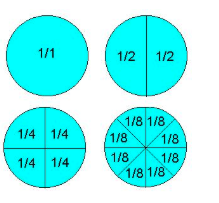
Digital Fraction Book

Overview
Students have fun creating, sharing and reading their own digital fractions math book created on StoryJumper.
Learning Objectives
Students will:
- Be able to create their own fraction math book.
- Be able to add illustrations and writing as well as read their own report.
Vocabulary
Vocabulary Words:
- Fluency: Fluency is the ability to speak accurately and clearly.
- Collaborate: To Collaborate is to work together.
- Template: A template is a material used as a pattern.
- Fraction: A fraction is a part of a whole
Pre-planning
To prepare for this lesson:
- The teacher should create a free account on storyjumper.com.
- The teacher should register students in his/her class.
- The teacher should provide students with a rubric.
- Lesson plans are available on the website.
- Watch the following video:
Note: The teacher can create books for class collaboration.
Accommodations
See Accommodations Page and Charts on the 21things4students.net site in the Teacher Resources.
Steps
Directions for this activity:
- Have students log onto their StoryJumper account.
- Students click on create New Book.
- Students should watch the introduction video for basic instructions.
- Students can create their own illustrations and take a snapshot to import.
- Students watch the number line video.
- Students explain in writing the fraction, create word problems.
- Students can draw number lines to represent fractions and import snapshots.
Assessment Options
Different options for assessing the students:
- Observations
- Check for understanding
- Have students share fraction math books with the class for observation.
- The teacher provides a rubric.
MITECS COMPETENCIES & ISTE STANDARDS
MITECS: Michigan adopted the "ISTE Standards for Students" called MITECS (Michigan Integrated Technology Competencies for Students) in 2018.
Innovative Designer
4a. Students know and use a deliberate design process for generating ideas, testing theories, creating innovative artifacts or solving authentic problems.
4b. Students select and use digital tools to plan and manage a design process that considers design constraints and calculated risks.
4c. Students develop, test and refine prototypes as part of a cyclical design process.
4d. Students exhibit a tolerance for ambiguity, perseverance and the capacity to work with open-ended problems.
Devices and Resources
Device: PC, Chromebook, Mac, iPad
Browser: Chrome, Safari, Firefox, Edge, ALL
Apps. Extensions, Add-ons
Websites:
How to Create a StoryJumper Book
CONTENT AREA RESOURCES
ELA
Students practice writing and fluency.
Math
Students create a math book showing different skills.
Science
Students create a book on current science topics.
Social Studies
Students create a book on current SS topics.
Credits
This task card was created by Julie Hoehing, Lake Shore Public Schools, February 2020. Updated December 2021.


